Martin Milmore
Martin Milmore (1844–1883) was an American sculptor.
Martin Milmore | |
|---|---|
.jpg.webp) | |
| Born | September 14, 1844 Sligo, Ireland |
| Died | July 21, 1883 (aged 38) Boston, Massachusetts |
| Nationality | American |
| Education | Boston Latin School; Lowell Institute |
| Known for | Sculpture |
| Notable work | |
| Movement | Thomas Ball |
| Memorial(s) | Death and the Sculptor |
Life and career
Martin Milmore was born in Sligo, Ireland on September 14, 1844.[1] He immigrated to Boston at age seven, graduated from Boston Latin School in 1860, took art lessons at the Lowell Institute, and learned to carve in wood and stone from his older brother Joseph (1841–1886).[2]
He entered the studio of Thomas Ball of Charlestown in his early teens and stayed until the mid-1860s. His first sculptures seem to have been cabinet-size busts of Henry Wadsworth Longfellow (New Hampshire Historical Society, Concord) and Charles Sumner, both modeled from life around 1863. In the 1860s he worked from the Studio Building.[3]
By his 20th birthday, Milmore received a commission for three giant figures ("Ceres", "Flora" and "Pomona") for the front of the Horticultural Hall in Boston; the restored versions are now on display at the Elm Bank Horticulture Center.
He subsequently designed the Roxbury Soldiers' Monument at Forest Hills Cemetery in Jamaica Plain, Massachusetts (1867), the American Sphinx in Mount Auburn Cemetery (1872), the Statue of John Glover on Commonwealth Avenue (1875), the Soldiers and Sailors Monument for the Boston Common (1877), and a bust of Senator Charles Sumner, now displayed in the United States Senate.
Milmore died in Boston on July 21, 1883.[4] Daniel Chester French created a memorial tribute entitled Death and the Sculptor for the grave of Milmore and his brother in Forest Hills Cemetery.[5]
Gallery
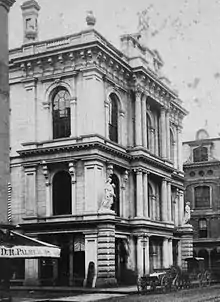
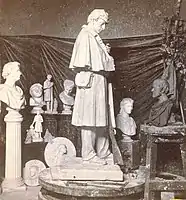 Milmore's studio, c.1867
Milmore's studio, c.1867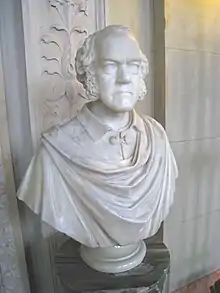
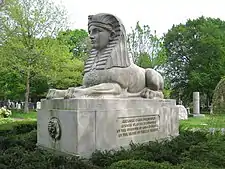

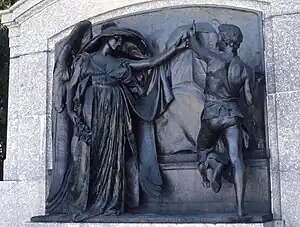
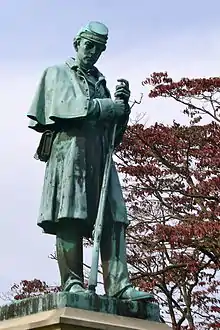
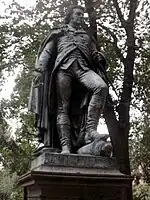
References
Notes
- The National Cyclopaedia of American Biography. Vol. VIII. James T. White & Company. 1924. p. 291. Retrieved January 21, 2021 – via Google Books.
- Taft, Lorado, Modern Tendencies in Sculpture: The Scammon Lectures at the Art Institute of Chicago, 1917, University of Chicago Press, Chicago, Illinois, 1922 p. 252
- Boston Directory. 1868
- "Martin Milmore, Sculptor". The Boston Globe. July 22, 1883. p. 6. Retrieved January 21, 2021 – via Newspapers.com.
- Wilson, Susan, Garden of Memories: A Guide to Historic Forest Hills, Forest Hills Educational Trust, 1998 p. 61–62,
Bibliography
- Walter G. Strickland, ed. (1913). "Milmore, Martin (b. 1844, d. 1883)". Dictionary of Irish Artists.